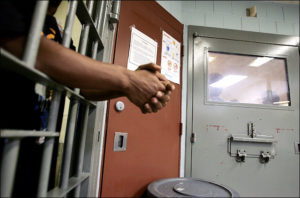
With an evident sense of hopelessness and despair in his voice, that was the message Kalief Browder told his mother on Friday—a day before he would take his own life.
Browder is one of the extremely tragic but far too common stories of how the criminal justice system targets, attacks and destroys Black bodies.
For three years Browder spent his life behind bars, facing the abuse of prison guards and Rikers Island inmates, for a crime he didn’t even commit.
It was also a crime he had never even been tried for—for three years.
The 16-year-old New Yorker was accused of stealing a backpack, a crime that suddenly became punishable by torture and death.
For three years Browder awaited the trial that would never come and for more than 400 days he was locked up in solitary confinement. Eventually, in 2013, Browder’s case would be dismissed and the reality that he faced three years of torture for absolutely no reason would forever leave him scarred and “broken.”
“I think what caused the suicide was his incarceration and those hundreds and hundreds of nights in solitary confinement, where there were mice crawling up his sheets in that little cell,” an emotional Paul V. Prestia, Browder’s lawyer, told The Los Angeles Times on Sunday. “Being starved, and not being taken to the shower for weeks at a time…those were direct contributing factors…That was the pain and sadness that he had to deal with every day, and I think it was too much for him.”
That’s exactly what Browder implied during his first interview with the New Yorker years ago. When he first sat down with reporter Jennifer Gonnerman following his release, he knew that his tragic experiences had forever changed him and the outcome of his future.
Despite a strong case against the city of New York, money would never undo what a tragically twisted and evil criminal justice system did to a teenager who had done nothing wrong.
“People tell me because I have this case against the city I’m all right,” he told Gonnerman. “But I’m not all right. I’m messed up. I know that I might see some money from this case, but that’s not going to help me mentally. I’m mentally scarred right now. That’s how I feel. Because there are certain things that changed about me and they might not go back.”
His mother worked tirelessly to convince her son that things would, some day, be okay again. She showered him in support and positivity and she continued to give him the undying love that he was so deserving of. But, unfortunately, there are monsters so hideous and unnerving that even a mother’s love can’t eradicate them.
“[On Saturday afternoon], at about 12:15 P.M., he went into another bedroom, pulled out the air conditioner, and pushed himself out through the hole in the wall, feet first, with a cord wrapped around his neck,” Gonnerman wrote of Browder’s tragic suicide. “His mother was the only other person home at the time. After she heard a loud thumping noise upstairs, she went upstairs to investigate, but couldn’t figure out what had happened. It wasn’t until she went outside to the backyard and looked up that she realized that her youngest child had hanged himself.”

But it was truly the hands of crooked cops, a flawed criminal justice system, horrific racism and a blatant disregard for Black lives that had their fingers wrapped around Browder’s throat as he hung outside that bedroom window.
As Browder’s attorney explained, it’s the type of tragedy that fully encapsulates the necessity and reality of the Black Lives Matter movement. This was not a wrong decision made in a split second. This was not a case where the lines between right and wrong were uncomfortably blurry.
This was a murder that took years to accomplish. This was the result of years of awful decisions, blatant disrespect and cringe-worthy neglect of a Black boy.
It was the type of incident that you wouldn’t think would even take place in a country like America, but the Black community knows all too well how much blood stains the country’s red, white and blue peacock feathers.
“When you go over the three years that he spent [in jail] and all the horrific details he endured, it’s unbelievable that this could happen to teenager in New York City,” Prestia told Gonnerman. “He didn’t get tortured in some prison camp in another country. It was right here!”
But, some would argue, he did get murdered and tortured in another country—at least, a very different one from the one America pretends to be. The existence of two Americas, one for Black citizens and one for those basking in the reality of white privilege, is something that is deserving of constant criticism and in need of a dire revolution.
“This is more than mistaken policy,” The Atlantic’s Ta-Nehisi Coates writes, “This is cruelty—the long war to save the Blacks from themselves. Browder was not ‘the Blacks.’ He was his mother and father’s child—an individual. And yet for reasons as old as America, he was not treated like one.”


